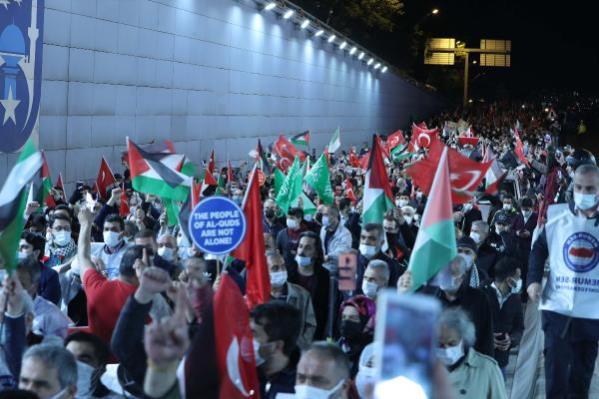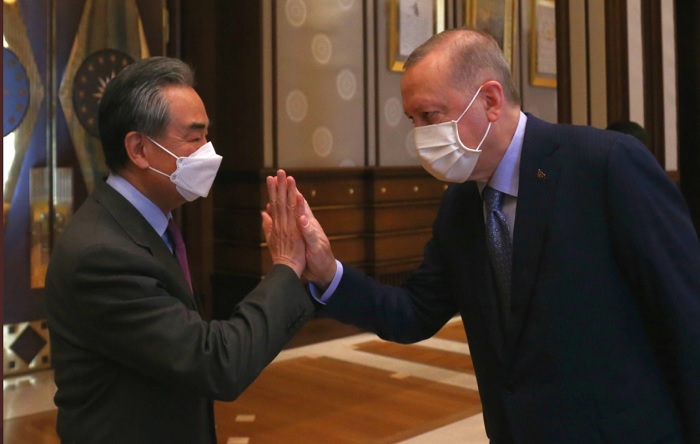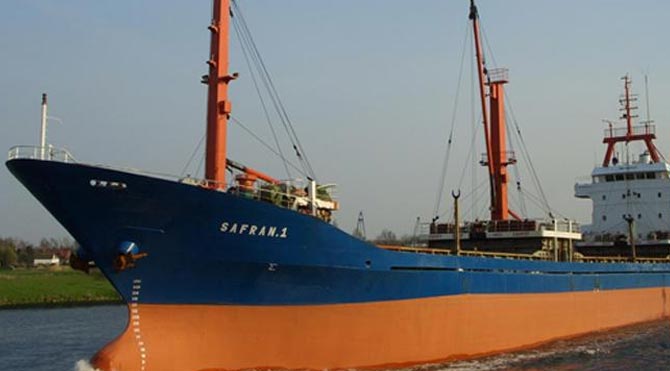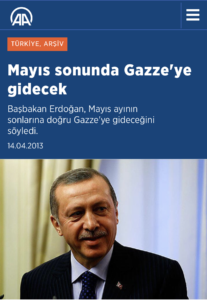Levent Kenez/Stockholm
The escalation between Israel and Palestine no doubt offers vast opportunities for an Islamist leader like Turkish President Recep Tayyip Erdoğan, who enjoys being portrayed as the leader of Muslims around the world, to propagandize in order to close ranks against “foreign powers,” set the agenda at home and continuously slam the opposition.
However, being isolated from Western allies and major Muslim states as well as serious domestic problems that include poor economic performance and mismanagement of the COVID crisis from the very beginning would appear to not allow Erdoğan to politically profit this time from the violence between Jews and Arabs after Israeli police stormed the Al Aqsa Mosque on May 7, despite his government’s powerful propaganda machine.
אנו מגנים בחריפות את ההתקפות המתועבות של ישראל נגד הקיבלה הראשונה שלנו מסגד אל אקסא , המתרחשות למרבה הצער, בכל חודש רמדאן.
כטורקיה, אנו נמשיך לעמוד לצד אחינו ואחיותינו הפלסטינים בכל הנסיבות.
— Recep Tayyip Erdoğan (@RTErdogan) May 8, 2021
Erdoğan’s first reaction came on Twitter, where he posted a message in four languages — Turkish, English, Arabic and Hebrew — on May 8, stating: “We strongly condemn Israel’s heinous attacks against our first qibla #AlAqsaMosque, that are unfortunately being carried out every Ramadan. As Turkey, we will continue to stand by our Palestinian brothers and sisters in all circumstances.” Several hours after this relatively restrained message, speaking to a group of mothers from the city of Diyarbakır at an iftar (fast-breaking dinner) in Ankara, Erdoğan said, “Cruel Israel, terrorist state Israel is mercilessly and unethically attacking Muslims in Jerusalem who dream of nothing but protecting the things they deem sacred, the homes they have inherited from their ancestors through the generations, their lands,” and called on the international community to act against Israel’s violence.
Erdoğan has called Israel a terrorist state many times in the past, a deliberate move that he surely believes makes him popular and a hero in the eyes of many Muslims around the world who think their leaders are selective and not brave enough when it comes to Israel. A point worth mentioning is that the state-run Anadolu news agency, which covers all of Erdoğan’s speeches and remarks in English, did not publish his diatribe against Israel in its English edition, sharing it only in Turkish and Arabic.
Reporting extensively from Israeli and Palestinian cities during the latest crisis, Anadolu gave broad coverage to the Palestinians, who praised Erdoğan’s campaigning for years to win their favor thanks to state-funded humanitarian projects. Nordic Monitor previously reported how the state-run Turkish Cooperation and Development Agency (TİKA) transferred money allocated from discretionary funds to its office in Gaza for the use of Hamas.
❝İki gözümün nuru Erdoğan, hadi gel Filistin'i özgürlüğüne kavuştur❞
Kudüs'ün Şeyh Cerrah mahallesinden Türkiye halkı ve Cumhurbaşkanı Erdoğan'a selam https://t.co/Dihp5O2ZJG pic.twitter.com/iQCihoVnRH
— Anadolu Ajansı (@anadoluajansi) May 10, 2021
In a much-shared Anadolu post by Erdoğan followers and pro-government media outlets, Fatima Es-Sus, a Palestinian activist, is seen chanting, “Erdoğan, the light of both my eyes, come and liberate Palestine,” to an Anadolu reporter, adding: “Come and establish the Ottoman Empire again. Let’s live together not only for 500 years but for thousands of years.”

However, not everything is as the pro-government media tries to portray it given the fact that the majority of Turks distrust mainstream media outlets that are under the strict control of the government and thus prefer social media, particularly Twitter and Facebook, as sources of information. Many people on social media reacted to thousands of people gathering outside the Israeli Embassy in Ankara and its consulate in Istanbul to protest Israel despite a full pandemic lockdown, claiming that law enforcement takes a hands-off approach to pro-government protesters whereas people critical of the government are not allowed to demonstrate under the pretense of COVID restrictions. Last week the gendarmerie fined villagers who were protesting the opening of a stone quarry by a pro-government company in İkizdere, a village in northern Rize province, for failing to comply with a curfew. Turkey is one of the countries worst affected by COVID, with the highest infection rate in Europe. Erdoğan was criticized for having held crowded political rallies that led to a spike in cases. Consequently, the government had to announce of a 17-day full lockdown without offering any financial aid to shopkeepers and farmers.

Turkish police raided a mosque in the southeastern province of Gaziantep and detained several dozen followers of anti-government religious group the Furkan Foundation who wanted to perform a religious ritual peculiar to the Muslim holy month of Ramadan. The police raided the mosque wearing their shoes, which is regarded as disrespectful, and used pepper spray and force to disperse the Furkan followers because they were violating coronavirus measures. Many social media users likened the incident to Israel’s storming and injuring worshippers in the Al Aqsa Mosque, calling Erdoğan’s reaction to the wounded Palestinian worshippers hypocritical.

Erdoğan faces strong criticism over his relations with China, which is brutally violating the human rights of the the Uighur minority, a predominantly Turkic-language-speaking Muslim group in Xinjiang province. While several European Union countries, Canada and the United Kingdom recognized China’s genocide of Uighurs and imposed sanctions on Chinese officials, last March Turkish police detained Uighur activists who were peacefully protesting China in front of the embassy before Chinese Foreign Minister Wangi Yi visited Ankara. Yi met with Erdoğan, who gave him a high five, which sparked a heated debate in which many argued that Erdoğan had betrayed the Uighurs in return for long-term credit deal. Health Minister Fahrettin Koca recently reacted to opposition leaders whom he claimed were raising sensitive issues — China’s treatment of Uighurs — in order to damage relations between Turkey and China, from which Turkey ordered millions of doses of COVID vaccine. People openly question why Erdoğan is not as defiant with China as he is with Israel if the issue is the oppressed masses.
Erdoğan’s flip-flops in his policy towards Israel is a favorite subject of his critics when Israel hits the headlines in Turkey as well as destroying his credibility in the eyes of many including his own supporters. After he unexpectedly snapped at then-Israeli President Simon Peres at a World Economic Forum debate in 2009 and accused Israel of killing innocent children in Gaza and left the podium without waiting for closing remarks, his popularity was at a peak, not only in Turkey but also in Muslim countries. However, he later told journalists that his reaction was directed at the moderator, not Peres.

When the Israeli navy killed nine Turkish and one Turkish-American pro-Palestinian activists in the Mavi Marmara flotilla in 2010, it sparked a diplomatic crisis as then-Prime Minister Erdoğan used the issue extensively as a political tool at domestic rallies. In 2011 Erdoğan announced that Turkey was suspending trade and military relations with Israel. However, it was exposed by the main opposition Republican People’s Party that the Safran 1, which belonged to Erdoğan’s elder son Burak, sailed between Turkish and Israeli ports many times transporting goods back and forth.
In 2014 Erdoğan had harshly criticized Fethullah Gülen, a vocal critic who had said, “The aid could have been delivered to Gaza without the bloodshed and violence after first obtaining the consent of the authorities,” following the Mavi Marmara incident. Erdoğan said, “What was he saying? ‘They didn’t get permission from the authorities.’ Who are the authorities? Is it the ones they love in the south [Israel], or us? If we are the authority, then we already gave permission. But the authority is Israel for them.”

Ironically, in 2016 Erdoğan refuted his own argument and criticized organizers of the Mavi Marmara flotilla, saying, “Did you ask the then-prime minister for permission to organize that aid campaign?”
Many believe that Erdoğan has very little power at the diplomacy table. Turkey has just begun seeking to normalize relations with Egypt and Saudi Arabia, which are important actors in the Arab League and the Organisation of Islamic Cooperation (OIC). Both Egypt and Saudi Arabia imply that Erdoğan should prove his sincerity and give concessions such as withdrawing his open support for the Muslim Brotherhood, which is listed as a terrorist organization by Egypt, Saudi Arabia, the United Arab Emirates and some of the other Gulf states and has close relations with Hamas.
It is no secret that US President Joe Biden and Erdoğan don’t get along well. Unhappy with former President Donald Trump’s defeat in the last election, Erdoğan said troubled relations between Turkey and the US had sunk to a new low after Biden formally recognized the Armenian genocide in April. Moreover, the US officially announced it had excluded Turkey from the F-35 fighter jet production program last month because Ankara had purchased a Russian S-400 missile system.
The European Union is reluctant to resume negotiations with Turkey due to its abysmal human rights record. The only area of cooperation is migration, in which Turkey is willing to keep refugees in its territory in return for financial compensation. The dismissal of European Court of Human Rights’ rulings has already has sparked an adverse reaction from member countries.
It looks like the team of lonely Erdoğan will work on more public relations activities that help him to be seen by his Islamist and national supporters as the constant defender of Muslims around the world as political experts predict a snap election in the coming year.












